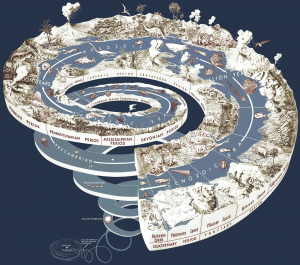
This is the first in a series of posts on this theme, following on from the introduction. They will be fairly random, whatever comes to mind at the time, based upon a reading of the five books mentioned there. Before I launch into that, however, here are a few preliminary observations:
- The three options in the title are not the only ones available. Creationism and Intelligent Design are usually associated with Christianity. There are also spiritual perspectives from other traditions to consider — Hinduism, Buddhism, Qabalah, and various esoteric systems.
- Creationism and Intelligent Design are not the same thing (the most obvious evidence is that advocates of ID criticise Creationists). Do not let atheist scientists tell you otherwise. They lump them together, saying that ID is Creationism in disguise. This is because both schools of thought believe in a supernatural intelligence, an idea that materialists want to discredit. However, Creationism is a theological worldview based upon a literal reading of the Bible, whereas the best quality Intelligent Design arguments are scientifically based, even if their advocates may be Christians or come from other spiritual traditions. They do not speculate about the nature of the designer, which remains an open question.
- The word evolution is often misused. It should mean merely change over time, perhaps with the implication of progress towards higher, more complex forms. However, it is often used when Darwinian evolution is what is meant. This enables materialist scientists to call those who oppose Darwinism evolution-deniers. Even worse, the outrageous Richard Dawkins has called them history-deniers, trying to insist that Darwinian evolution theory is a historical fact. At the same time he is quite deliberately, disgracefully, and mistakenly, trying to establish a connection in the reader’s mind between critics of Darwinian evolution and holocaust-deniers, the real history-deniers (1). It is quite possible to believe in evolution, while rejecting Darwinism. Thus Stephen Talbott, a biologist I especially admire, is critical of both Darwinian theory and Intelligent Design (2).

- Regarding Intelligent Design, to state the obvious, it consists of two words. So the emphasis can fall on either. Its advocates stress the design element. That’s fine up to a point, but the problem is that this conjures up a picture of a specific supernatural deity, usually the Christian one, coming up with a plan, in the manner of a human creative artist, or scientific experimenter. Many people, for obvious reasons, find this idea hard to accept. I therefore think that it makes more sense to emphasise the intelligent element, which leaves the understanding of the process much more open. It is even possible to combine the two ideas, an initial idea (design) which grows and develops over time, an ongoing process of creative, intelligent evolution. This does not rule out some limited acceptance of Darwinian ideas as part of the total process, since some spiritually minded scientists , far more qualified than me, have found no reason to doubt it, e.g. Sir Alister Hardy, former Professor of Zoology at Oxford (3). I do find his position difficult to understand, however.
- Darwinism is atheism thinly disguised as science. That will be the subject of my next post. In advance of that, I’ll just point out that its later manifestation neo-Darwinism stresses the blind process of natural selection, random genetic mutation, and lack of purpose (teleology), in order to support a materialist, therefore atheistic, explanation for the universe.
======================================================================================================
I have written in the past about the many scientists and philosophers critical of Darwinism. If interested, please click here and here.
Footnotes:
(1) In The Greatest Show On Earth: The Evidence for Evolution, he says “The evidence for evolution is at least as strong as the evidence for the Holocaust, even allowing for eye witnesses to the Holocaust.” This, quite rightly, provoked a strong response: “Is that some sort of cruel joke? The evidence for Darwin’s account of evolution and, more so, its controversial mechanism of natural selection is a matter of inference, no matter how strong you think the inference is. The evidence for the Holocaust includes countless eye-witness accounts — a very different and superior order of evidence”. https://evolutionnews.org/2009/09/richard_dawkinss_jewish_proble/
(2) You can check him out at http://www.thethirdwayofevolution.com/people/view/stephen-talbott
(3) See, for example, Darwin and the Spirit of Man, Collins, 1984
